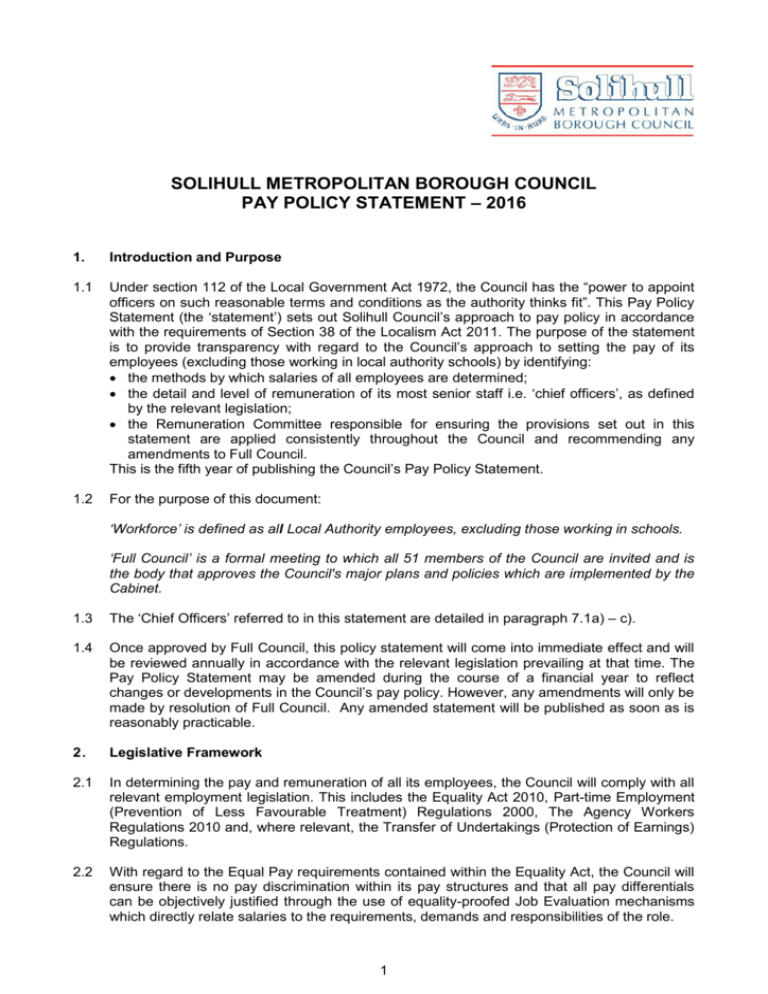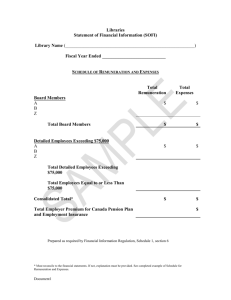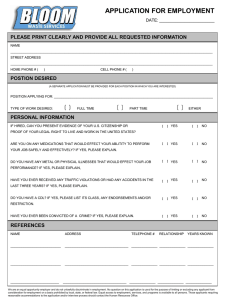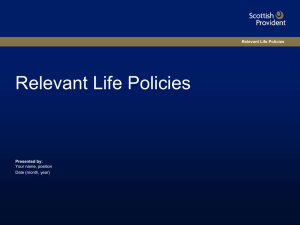Pay Policy Statement - Solihull Metropolitan Borough Council
advertisement

SOLIHULL METROPOLITAN BOROUGH COUNCIL PAY POLICY STATEMENT – 2016 1. Introduction and Purpose 1.1 Under section 112 of the Local Government Act 1972, the Council has the “power to appoint officers on such reasonable terms and conditions as the authority thinks fit”. This Pay Policy Statement (the ‘statement’) sets out Solihull Council’s approach to pay policy in accordance with the requirements of Section 38 of the Localism Act 2011. The purpose of the statement is to provide transparency with regard to the Council’s approach to setting the pay of its employees (excluding those working in local authority schools) by identifying: the methods by which salaries of all employees are determined; the detail and level of remuneration of its most senior staff i.e. ‘chief officers’, as defined by the relevant legislation; the Remuneration Committee responsible for ensuring the provisions set out in this statement are applied consistently throughout the Council and recommending any amendments to Full Council. This is the fifth year of publishing the Council’s Pay Policy Statement. 1.2 For the purpose of this document: ‘Workforce’ is defined as all Local Authority employees, excluding those working in schools. ‘Full Council’ is a formal meeting to which all 51 members of the Council are invited and is the body that approves the Council's major plans and policies which are implemented by the Cabinet. 1.3 The ‘Chief Officers’ referred to in this statement are detailed in paragraph 7.1a) – c). 1.4 Once approved by Full Council, this policy statement will come into immediate effect and will be reviewed annually in accordance with the relevant legislation prevailing at that time. The Pay Policy Statement may be amended during the course of a financial year to reflect changes or developments in the Council’s pay policy. However, any amendments will only be made by resolution of Full Council. Any amended statement will be published as soon as is reasonably practicable. 2. Legislative Framework 2.1 In determining the pay and remuneration of all its employees, the Council will comply with all relevant employment legislation. This includes the Equality Act 2010, Part-time Employment (Prevention of Less Favourable Treatment) Regulations 2000, The Agency Workers Regulations 2010 and, where relevant, the Transfer of Undertakings (Protection of Earnings) Regulations. 2.2 With regard to the Equal Pay requirements contained within the Equality Act, the Council will ensure there is no pay discrimination within its pay structures and that all pay differentials can be objectively justified through the use of equality-proofed Job Evaluation mechanisms which directly relate salaries to the requirements, demands and responsibilities of the role. 1 3. Accountability and Decision Making 3.1 In accordance with the Constitution of the Council, the Remuneration Committee is authorised to determine any activity within its terms of reference, the parameters of the Pay Policy and the budget framework agreed by the Council. The full Terms of Reference of the Remuneration Committee are shown at Appendix B. 4. Pay Structure (see also section 6) 4.1 The pay of Chief Officers is referred to in paragraph 7.1. 4.2 The Council uses the nationally negotiated pay spine as the basis for its local grading structure. Points 7-49 of the pay spine are determined nationally and points 50-76 were determined locally in April 2000, as part of the Single Status Collective Agreement. This pay spine (see Appendix C) applies to the majority of the workforce and any increases are negotiated nationally. 4.3 The Council remains committed to adherence with national pay bargaining in respect of the national pay spine. Chief Officers have received no increase since 2008 and a pay freeze was in place for employees from 2009 to 2012. In 2013 basic salaries for employees were increased by 1%. This did not apply to Chief Officers. In November 2014, the National Joint Council for Local Government Services agreed that pay spine points up to 49 be increased by 2.2% with effect from 1 January 2015. Locally, it was agreed by the Remuneration Committee that points 50-76 should also be increased by 2.2%. These increases did not apply to Chief Officers. 4.4 There are two groups of staff (excluding Chief Officers) who are not covered by the pay structure shown at Appendix C. They are those staff who transferred into the Council and whose pay is protected in law under the Transfer of Undertakings (Protection of Earnings) or who have historically been paid under Soulbury* terms and conditions. * The Soulbury Committee was established in 1948 to provide voluntary collective bargaining machinery for advisory staff in local education authorities. The Council employs 3 staff who are employed in accordance with Soulbury Terms and Conditions. In addition to the annual pay discussions, this Committee determines the national salary framework. 4.5 In determining its grading structure and setting remuneration levels for all posts, the Council has taken account of the need to ensure value for money in respect of the use of public resources. This is balanced against the need to attract, retain and motivate competent and talented staff on a sustainable basis to deliver the required public services. 4.6 All pay related allowances paid as a means of remuneration for non standard working patterns, are the subject of either nationally or locally negotiated rates, having been determined from time-to-time in accordance with collective bargaining machinery and/or as determined by Council policy. 4.7 New appointments will normally be made at the minimum of the relevant grade, although this can be varied where necessary to secure the most suitable candidate. From time to time it may be necessary to take account of the external pay market in order to attract and retain employees with particular experience, skills and capability. A revised market forces policy was agreed by the Remuneration Committee in January 2013. 4.8 Where necessary, the Council ensures the requirement for such is objectively justified by reference to clear and transparent evidence of relevant market comparators, using appropriate data sources available from within and outside the Local Government Sector. 2 5. Incremental Progression 5.1 There is no automatic progression through the incremental salary scale. Progression within the relevant grade is subject to achieving challenging objectives and routinely demonstrating corporately determined behavioural qualities, which are agreed in advance by managers and assessed annually. Any salary progression is dependent upon there being demonstrable evidence of achieving performance improvements and delivering defined targets. 5.2 The Council's Performance and Development Review Framework provides the means of recognising and valuing the individual contribution of every employee within the organisation. The framework is designed to reward high performance and support continued career development. A modified scheme was introduced at the start of the 2015 performance year. This scheme simplified the way in which employee behaviours are assessed and provided a framework that supports the Council’s ambition of moving from ‘good to great’. 5.3 The framework enables every employee to: understand what is required of them in their role; understand how their daily work and objectives link to performance plans and the Council's key priorities; receive constructive feedback on their performance; explore and agree their development needs and options. 5.4 As part of the Performance and Development Review Framework the maximum award an employee can receive is one increment. Where employees are at the top of their grade, an unconsolidated award that is equivalent to one increment can be paid. These awards are only made to employees who deliver strong performance and are exemplary in displaying the Council’s behaviours. In 2015, 284 employees (10.69% of employees assessed) received this award. 5.5 From the Chief Executive down to first-level line managers, objective setting and measurement are part of the day-to-day skills of managing people. A programme of coaching and training has been established to support any employee who is required to review the performance of others. This is aimed at ensuring honest and regular feedback becomes the foundation of any performance conversation, and that all employees are treated fairly, equally and consistently. 6. Senior Management Hierarchy Position Chief Executive Director of Resources and Deputy Chief Executive Director Assistant Director Head of Service Head of Service Salary Grade Chief Executive Deputy CE Director 1 AD HoS 1 HoS 2 7. Senior Management Remuneration 7.1 For the purposes of this statement, senior management means ‘chief officers’ as defined within S43 of the Localism Act. As a result of a significant increase in duties and responsibilities the Council’s Director of Resources was re-designated by Full Council at its meeting on 1 December 2015 as Director of Resources and Deputy Chief Executive with effect from 1 January 2016. A revised salary banding for the Chief Executive was also approved at the same meeting. 3 The posts falling within the statutory definition are set out below: a) Chief Executive The salary of the post is £138,750. The salary falls within a range of three incremental points between £138,750 rising to a maximum of £146,000. An additional payment is made for Returning Officer duties. The Returning Officer fees are determined and paid by the Ministry of Justice for all National and European elections, rather than the Council. The payments made in 2015/2016 were as follows (The duties of Returning Officer are detailed in Appendix A):National Government Elections £8,446 b) Director of Resources and Deputy Chief Executive The salary of the post is £118,000. The salary of the post falls within a range of three incremental points between £118,000 rising to a maximum of £124,000. c) Directors and Corporate Leadership Team Members Grade Director 1 * Director of Public Health and Commissioning No. of Posts 3 Salary Range (£) 100,937 - 107,309 1 132,330 * Director of Children’s Services and Skills receives a market forces supplement of £8,000 per annum. (Details of the Council’s Corporate Leadership Team are provided in Appendix A.) Other Directors Grade Assistant Director d) No. of Posts 6 Other Officers (Heads of Service and/or reports to a Director) Post Head of Service 1 Head of Service 2 Other staff reporting to Directors or at Head of Service level* No. of Posts 13 21 1 1 8 2 Public Health staff transferred to the Council on 1/4/13 2 1 1 1 1 1 2 * e) Salary Range (£) 76,766 – 81,894 Salary Range (£) 65,820 – 69,603 57,181 – 60,051 54,998 – 67,805 45,707 – 56,504 44,790 – 54,326 27,123 – 33,857 65,922 – 81,618 55,548 – 67,805 46,164 – 57,069 44,790 – 54,326 39,267 – 48,606 39,632 - 47599 31,072 – 40,964 Includes Adult Social Care positions that transferred to the Council under TUPE – April 2011 Regional positions Post No. of Posts PVVP Strategic Regional 1 Programme Manager 4 Salary Range (£) 57,181 – 60,051 8. Recruitment of Chief Officers 8.1 When recruiting to all posts, the Council takes full and proper account of its own Recruitment and Equality & Diversity policies. 8.2 The determination of the remuneration to be offered to any newly appointed chief officer will be in accordance with the pay structure and relevant policies in place at the time of recruitment. Where the Council is unable to recruit to a post at the designated grade, it will consider the use of market forces supplements in accordance with its relevant policies. 8.3 Where the Council remains unable to recruit chief officers under a contract of service, or there is a need for interim support to provide cover for a vacant substantive chief officer post, the Council will, where necessary, consider engaging individuals under ‘contracts for service’. These will be sourced through a relevant procurement process ensuring the council is able to demonstrate the maximum value for money benefits from competition in securing the relevant service. 9. Additions to Salary of Chief Officers 9.1 The Council does not apply any bonus payments to its Chief Officers. 10. Payments on Termination 10.1 The Council’s approach to statutory and discretionary payments on termination of employment of chief officers, prior to reaching normal retirement age, (within the terms of the Local Government Pension Scheme) is set out within its policy statements in accordance with Regulations 5 and 6 of the Local Government (Early Termination of Employment) (Discretionary Compensation) Regulations 2008 and Regulations 12 and 13 of the Local Government Pension Scheme (Benefits, Membership and Contribution) Regulations 2008 (to be amended for the 2014 changes to the Pension Scheme). These statements are shown in Appendix D. 10.2 In cases where severance payments are over £100,000, Full Council approval is required. Currently, all severance packages, where the total cost exceeds the annual salary (plus oncosts), require the approval of Remuneration Committee. Any severance packages above £100,000 are considered by the Remuneration Committee prior to being presented to Full Council. 11. Publication 11.1 Upon approval by the Full Council, this statement will be published on the Council’s Website. In addition, for posts where an employee reports to the Chief Executive, the Council’s Annual Statement of Accounts will include a note setting out the total amount (gross) of: salary, fees or allowances paid to or receivable by the person in the current and previous year; any bonuses so paid or receivable by the person in the current and previous year; any sums payable by way of expenses; any compensation for loss of employment and any other payments connected with termination; any other emoluments; total remuneration. 12. Lowest Paid Employees 12.1 The relationship between the rate of pay for the lowest paid and chief officers is determined by the processes used for determining pay and grading structures as set out earlier in this policy statement. The lowest paid Council employees are those on Band A (£13,715 £15,207 per annum). 5 The new National Living Wage of £7.20 per hour will be introduced on 1 April 2016. This equates to a minimum annual salary of £13,891. 12.2 The statutory guidance under the Localism Act recommends the use of pay multiples as a means of measuring the relationship between pay rates across the workforce and that of senior managers, as included within the Hutton ‘Review of Fair Pay in the Public Sector (2010)’. The Hutton Report was asked by Government to explore the case for a fixed limit on dispersion of pay through a requirement that no public sector manager can earn more than 20 times the lowest paid person in the organisation. One of the key drivers behind the use of the multiple was concern due to the growth in the pay of senior managers and, specifically, in relation to the rest of the workforce. The report concluded that the relationship to median earnings was a more relevant measure and the Government’s Code of Recommended Practice on Data Transparency recommends the publication of the ratio between highest paid salary and the median salary of the whole of the authority’s workforce. 12.3 The pay levels with effect from 1 April 2016 within the Council define the multiple between the lowest paid (full time equivalent) employee and the Chief Executive as 1:9.6 based on the top of the salary band. The median salary is £22,212 and the multiple between the median full time equivalent earnings and the Chief Executive is 1:6.2. 12.4 As part of its overall and ongoing monitoring of alignment with external pay markets, both within and outside the sector, the Council will use available benchmark information, as appropriate. 12.5 The Council employs Apprentices who are engaged on a training contract. The salary paid to these employees does not fall within the nationally negotiated pay spine and they are not included within the definition of ‘lowest paid employees’. 13. Trade Union Facility Time 13.1 The Council plans to spend £48,040 on Trade Union facility time during 2016/17. represents 0.06% of the total salary bill. 13.2 Solihull Council currently charges Trade Unions for administering the deduction of membership subscriptions from employees’ pay. 6 This APPENDIX A The Corporate Leadership Team Solihull Council employs approximately 3000 employees (excluding schools), has an annual revenue budget of around *£136.5 million and provides a wide range of public services to 206,700 residents. The Corporate Leadership Team is responsible for managing the activities of the Council’s workforce and for advising elected members on the potential implications of their decisions. By law, senior Council employees are not allowed to participate in any party political activity. * This is a lower figure than used in previous years as annual revenue is now calculated using a different formula. The team consists of a: Chief Executive Director of Resources and Deputy Chief Executive Director of Managed Growth Director of Communities and Adult Social Care Director of Children’s Services and Skills Director of Public Health and Commissioning An outline of the responsibilities of the roles of the Corporate Leadership Team is provided below. The Chief Executive The Chief Executive is the Senior Officer who leads, and takes responsibility for, the work of the paid staff of the Council. The role of Chief Executive is a full-time appointment. Post holders are selected on merit, against objective criteria, following public advertisement. They are appointed by Full Council. The Chief Executive works closely with elected members to deliver: Leadership - working with elected members to ensure strong and visible leadership and direction, encouraging and enabling managers to motivate and inspire their teams. Strategic Direction - ensuring all staff understand and adhere to the strategic aims of the Council and follow the direction set by the elected members. Policy Advice - acting as the principal policy adviser to the elected members of the Council to lead the development of workable strategies which will deliver their political objectives. Partnerships – supporting the leadership and development of strong local and regional partnership working to achieve improved outcomes and better public services for local people. Operational Management - overseeing financial and performance management, risk management, people management and change management within the Council. Director of Resources and Deputy Chief Executive (Section 151 Officer) The Director of Resources and Deputy Chief Executive is responsible for all the Corporate Services of the Council. He also undertakes the Chief Executives’ duties in his absence. As the Council’s nominated Section 151 Officer, the Director has statutory responsibility for ensuring the financial health and probity of the Local Authority. As well as deputising for the Chief Executive they also lead the Council’s strategic approach to financial planning and management; council tax and business rates collection and benefits administration; facilities and asset management; strategic land projects; Human Resources and information and communications technology. The Director also leads on the Council’s ‘Agile Working’ programme. Following the deletion of two Director posts in 2015, this post now has responsibility for Democratic Services (including Monitoring Officer responsibility), Legal, Equality and Diversity, Corporate Performance, Policy and Information, Organisational and Workforce Development, Corporate 7 Procurement, Audit, Communications and financial responsibilities for Solihull Community Housing. Director of Managed Growth The Director has overall responsibility for all services associated with: place shaping; managing the environment, public protection, neighbourhood services; transport and highways; regeneration; promoting the economy and sustainable growth, and development in the Borough. The Director also has lead responsibility for the UK Central Programme. Director of Communities and Adult Social Care The Director is responsible for providing strategic leadership in the planning, commissioning and provision of Social Care services for older people, those who are suffering mental health problems or have disabilities, and protecting those who are vulnerable, from harm. The Director is also responsible for leading on the support that people require enabling them to live independently. Following implementation of the first phase of the Council’s Functional Review, this post now has responsibility for community related services, Libraries, Information and Arts Services, Customer Services, Community and Voluntary Sector Relations/Solihull Partnership and Homelessness. Director for Children’s Services and Skills In accordance with the statutory guidance, the Director of Children’s Services and Skills is responsible for safeguarding and promoting the welfare of children within the Borough, promoting the upbringing of such children by their families and ensuring the provision of a range and level of services appropriate to their needs, including education, undertaking the functions of the Council as Head of the Adoption Agency and employment and skills.. Director of Public Health and Commissioning The Director of Public Health and Commissioning has overall responsibility for the health of the people of Solihull, for health improvement and the reduction of health inequalities, and for providing strategic leadership in the development and commissioning of public health programmes and services. The Director is also responsible for commissioning in respect of Adult Social Care and Childrens Services. Role of the Returning Officer The Returning Officer is the person who has the overall responsibility for the conduct of elections. The Returning Officer is an officer who is appointed by the Council, under the Representation of the People Act 1983. Whilst appointed by the Council, the role of the Returning Officer is one of a personal nature, and distinct and separate from their duties as an employee of the Council. The Returning Officer is responsible for: the nomination process for candidates and political parties; provision and notification of polling stations; appointment of Presiding Officers and polling clerks; appropriate administration and security of polling stations; preparation of all ballot papers; the actual count and declaration of results; issue, receipt and counting of postal ballot papers; all candidates' election expenses returns; presentation of final account; reclamation of funding from external bodies, as prescribed. 8 APPENDIX B Remuneration Committee Terms of Reference Authority The Committee is authorised to determine any activity within its Terms of Reference and within the parameters of the Pay Policy and budget framework agreed by Council. Duties: 1. To formulate and recommend to Council a Pay Policy for the remuneration of the Chief Executive, Deputy Chief Executive, Directors and Heads of Service, having particular regard to the Council’s strategic objectives, equality duties and the need for transparency of process. Within the terms set out in the Pay Policy agreed by the Council: 2. To consider and approve the severance payments to any member of staff where the payment exceeds the annual salary of that employee, to ensure consistency, equity and probity in the use of public funds. Severance Packages in excess of £100,000 will be referred to Full Council for approval. 3. To consider and, where appropriate, approve all requests for market forces payments for a period of up to three years and review ongoing need. 4. To advise on the Council’s position with regards to proposals relating to nationally agreed pay awards. 5. To undertake reviews of relevant pay markets as and when required, and judge where to position Solihull Council in relation to other local authorities, taking into account what they are paying, relative performance and affordability. 6. To approve changes to employee benefits which do not require an amendment to the Pay Policy. 7. To ensure that all provisions regarding disclosure of remuneration are fulfilled. Membership The membership of the committee will be subject to “political balance” requirements and includes: The Cabinet Member for Resources and Delivering Value (Chair). Six other nominated elected members. An Independent Local Business Leader (Co-opted Non-Voting member). The Director of Employment Services (West Midlands Councils) shall normally be in attendance to advise the Committee. Quorum No business shall be transacted unless five members of the Committee are present, including the Chair or Deputy Chair. Frequency of Meetings The Committee shall meet at least twice annually, but otherwise as required. The Chair may convene a meeting at any time. Reporting The decisions of the Remuneration Committee meetings, other than those requiring the approval of full Council, shall be reported to the Council for information. 9 APPENDIX C Broad Band Pay Structure as at 01/04/2015 7 8 9 10 11 12 13 14 15 16 17 18 19 20 21 22 23 24 25 26 27 28 29 30 31 32 33 34 35 36 37 38 39 40 41 42 43 44 45 46 47 48 49 50 51 52 53 54 55 56 57 58 59 60 61 62 63 64 65 66 67 68 69 70 71 72 73 74 75 76 £13,715.00 £13,871.00 £14,075.00 £14,338.00 £15,207.00 £15,523.00 £15,941.00 £16,231.00 £16,572.00 £16,969.00 £17,372.00 £17,714.00 £18,376.00 £19,048.00 £19,742.00 £20,253.00 £20,849.00 £21,530.00 £22,212.00 £22,937.00 £23,698.00 £24,472.00 £25,440.00 £26,293.00 £27,123.00 £27,924.00 £28,746.00 £29,558.00 £30,178.00 £30,978.00 £31,846.00 £32,778.00 £33,857.00 £34,746.00 £35,662.00 £36,571.00 £37,483.00 £38,405.00 £39,267.00 £40,217.00 £41,140.00 £42,053.00 £42,957.00 £43,838.00 £44,790.00 £45,748.00 £46,696.00 £47,649.00 £48,606.00 £49,555.00 £50,513.00 £51,466.00 £52,417.00 £53,369.00 £54,326.00 £55,279.00 £56,230.00 £57,181.00 £58,141.00 £59,088.00 £60,051.00 £61,002.00 £61,951.00 £62,904.00 £63,910.00 £64,861.00 £65,820.00 £66,776.00 £67,905.00 £69,603.00 A £13,715 £13,871 £14,075 £14,338 £15,207 B £13,871 £14,075 £14,338 £15,207 £15,523 £15,941 £16,231 £16,572 C £15,941 £16,231 £16,572 £16,969 £17,372 £17,714 £18,376 £19,048 £19,742 £20,253 £20,849 D £19,742 £20,253 £20,849 £21,530 £22,212 £22,937 £23,698 £24,472 £25,440 £26,239 £27,123 £27,924 E £27,123 £27,924 £28,746 £29,558 £30,178 £30,978 £31,846 £32,778 £33,857 F £31,846 £32,778 £33,857 £34,746 £35,662 £36,571 £37,483 £38,405 G £39,267 £39,267 £40,217 £40,217 £41,140 £42,053 £42,957 £43,838 £44,790 £45,748 £46,696 £47,649 £48,606 H £44,790 £45,748 £46,696 £47,649 £48,606 £49,555 £50,513 £51,466 £52,417 £53,369 £54,326 Head of Service 2 £57,181 £58,141 £59,088 £60,051 Head of Service 1 £65,820 £66,776 £67,905 £69,603 10 APPENDIX D LOCAL GOVERNMENT PENSION SCHEME POLICY STATEMENT 1st APRIL 2014 Policy Statement for all Eligible Employees Under the Local Government Pension Scheme Regulations, each scheme Employer must publish and keep under review a Statement of Policy to explain how it will apply certain discretions allowed under the Pension Regulations. This Statement is applicable to all individuals, excluding Councillors of Solihull Metropolitan Borough Council (The Council), who are eligible to be members of the Local Government Pension Scheme (LGPS). Discretions to be applied under the LGPS Regulations 2013 and LGPS (Transitional Provisions and Savings Regulations 2014). REGULATION 16(2)e and REGULATION 16(4)d Explanation Where an active scheme member wishes to purchase extra annual pension of up to £6,500 (figure as at 1st April 2014) by making Additional Pension Contributions (APCs), the Employer can choose to contribute towards the cost of purchasing that extra pension via a Shared Cost Additional Pension Contribution (SCAPC). Policy The Council has not introduced a Shared Cost Additional Pension Contribution (SCAPC). REGULATION 30(6) and TP11(2) Explanation A member who is aged 55 or over and, with their Employer’s consent, reduces their hours and/or grade, can then, but only with the agreement of the Employer, make an election to the administering authority for all or part payment of their accrued benefits without having retired from that employment. If payment of benefits occurs before age 65, the benefits are actuarially reduced in accordance with guidance issued by the government actuary. The Employer may choose to waive the reduction in whole or in part. If the Employer chooses to do so, then the cost of waiving the reduction in whole or in part has to be paid to the fund. Policy Each specific case will be judged on its own merits, having fully considered service delivery and financial costs. This discretion will be exercised by the Director of Resources within his/her delegated authority or, if appropriate, the Council’s Remuneration Committee. REGULATION 30(8) Explanation The Employer has discretion to waive any actuarial reductions that would otherwise apply under Regulation 30(5) and Regulation 30(6) for active members, deferred members and suspended tier 3 ill-health pensioners who elect to receive early payment of benefits prior to normal pension age. 11 Policy Each specific request will be assessed on its own merits. Where the Council determines that the benefits should not be reduced the cost would need to be funded by a lump-sum contribution into the pension fund. This discretion will only be exercised in cases where it can be demonstrated that the Council can fund the cost of release within a three year period. This discretion will be exercised by the Director of Resources within his/her delegated authority or if appropriate the Council’s Remuneration Committee. TP REGULATION 1(1)(c) of SCHEDULE 2 Explanation The Employer has discretion to apply the 85 year rule protection to members who choose to voluntarily draw their benefits on or after age 55 and before age 60, (under paragraph 1(1)(c) or Schedule 2 to the LGPS (Transitional Provisions, Savings and Amendment) Regulations 2014. Policy The Council has not approved “switching on” of the 85 year rule. Waiving of actuarial reductions will only be considered where there is a clear financial or operational advantage to the Council. This discretion is exercised by the Director of Resources within his/her delegated authority or, if appropriate, the Council’s Remuneration Committee. REGULATION 31 Explanation The Employer has discretion to grant extra annual pension of up to £6,500 to an active scheme member or within 6 months of leaving to a member whose employment was terminated on the grounds of redundancy or business efficiency. Policy The Council will judge each case on its merits, having fully considered service delivery and financial costs. This discretion is exercised by the Council’s Remuneration Committee. 12 DISCRETIONS TO BE APPLIED UNDER THE LOCAL GOVERNMENT (EARLY TERMINATION OF EMPLOYMENT) (DISCRETIONARY COMPENSATION) (ENGLAND AND WALES) REGULATIONS 2008 REGULATION 5 (POWER TO INCREASE STATUTORY REDUNDANCY PAYMENTS) ABOVE THE WEEKLY PAY LIMIT CONTAINED WITHIN THE EMPLOYMENT RIGHTS ACT 1996 Explanation Employers have the discretion to use actual weekly pay, if this is greater than the statutory maximum weekly pay, contained within the Employment Rights Act 1996 (as amended) when calculating a redundancy payment. Policy The Council will use actual weekly pay, if this is greater than the maximum stated in the act, for the purposes of calculating a redundancy payment. REGULATION 6 (DISCRETIONARY COMPENSATION FOR REDUNDANCY) Explanation Employers have the discretion to pay compensation up to a maximum of 104 weeks pay to an employee who ceases to be employed by reason of redundancy. This applies only where the council has not awarded an increase in total pension membership under regulation 12(b) of the Local Government Pension Scheme Regulations 1997 (as amended). Where a redundancy payment under the Employment Rights Act 1996 (as amended) (ERA), is also made then the equivalent to it shall be deducted from the compensation. Policy The Council will pay compensation at a level of 2 times the number of weeks’ redundancy as calculated using the Statutory Redundancy Payments ready reckoner (occurring on or after 1 October 2006) up to a maximum of 60 weeks. Where a redundancy payment is also made under the ERA then the equivalent to it shall be deducted from the above compensation. OCCUPATIONAL PENSIONS SCHEMES (INTERNAL DISPUTE RESOLUTION PROCEDURES REGULATIONS 1996 (AS AMENDED)) Explanation Responsibility for determinations of complaints regarding awards made under the Local Government Early Termination of Employment) (Discretionary Compensation) England and Wales) Regulations 2008 (as amended) now rest with your Employer. Your Employer must specify the job title and address of the person to whom applications should be directed. In the first instance you should write to the “stage 1” person, if you are then still dissatisfied with that decision you may write to the “stage 2” person. Name of Employer: The “stage 1 person” is: Solihull Metropolitan Borough Council. Mr. Adrian Cattell Head of Human Resources Solihull Metropolitan Borough Council Council House, Manor Square Solihull West Midlands B91 3QB The “stage 2 person” is: Mr. Paul Johnson Director of Resources Solihull Metropolitan Borough Council Council House, Manor Square Solihull West Midlands B91 3QB 13 DISCRETIONS TO BE APPLIED UNDER THE LGPS (BENEFITS, MEMBERSHIP AND CONTRIBUTIONS) REGULATIONS 2007 (AS AMENDED) REGULATION 30A(3) Reg (MEMBER’S REQUEST SUSPENDED TIER 3 ILL HEALTH PENSION) FOR RE-INSTATEMENT OF A Explanation For a member on a suspended tier 3 Ill Health pension on or after age 55 and before age 60 (under regulation 30 A (3) of the LGPS Benefits, Membership and Contributions) Regulations 2007) an application for reinstatement will be granted. Policy Each specific case will be judged equally and fairly on its own merits. REGULATION 12 BReg POWER OF EMPLOYING AUTHORITY TO INCREASE TOTAL MEMBERSHIP OF ACTIVE MEMBERS Explanation An Employer may agree to increase the total membership of an active member. A member’s total additional membership, including additional membership in respect of different employment, must not exceed 10 years. Policy Each specific case will be judged on its own merits, having fully considered service delivery and financial costs. The Remuneration Committee will exercise this discretion. The Council is not obliged by the regulations to publish a statement on the following discretions, but has chosen to do so. REGULATION 3 BReg (CONTRIBUTIONS PAYABLE BY ACTIVE MEMBER) Explanation Employers will determine the contribution rate payable based on whole-time pensionable pay for existing members at 1 April each year or at the commencement of employment. Where there has been a material change to a member’s pensionable pay in the course of the financial year, his employing authority may re-determine the contribution rate to be applied. Policy The Council will not amend the contribution band in the course of a financial year should there be a material change to a member’s pensionable pay. REGULATION 16 AReg (RE-EMPLOYED AND RE-JOINING DEFERRED MEMBERS) Explanation Where a deferred member becomes an active member again before becoming entitled to the immediate payment of retirement benefits in respect of his/her former membership, he/she may elect to have his/her former membership aggregated with his/her current active membership. An election must be made in writing to the member’s appropriate administering authority before the expiry of the period of 12 months, beginning with the date that he/she again became an active member (or any such longer period as his/her Employer may allow). Policy The Council will only extend the period of 12 months in exceptional circumstances or where it was beyond the member’s control. 14 REGULATION 22 AReg (OPTIONAL CONTRIBUTIONS DURING UNPAID ABSENCES) Explanation Employing Authorities have the Discretion to extend the period beyond 30 days for a person to make contributions. Policy The Council will extend the period of 30 days in circumstances beyond the member’s control or in exceptional circumstances. Such requests must be made in writing by the member. REGULATION 83 AReg INWARD TRANSFERS OF PENSION RIGHTS – Explanation A person who becomes an active member (of the LGPS) who has relevant pension rights with a previous Employer, may request his/her fund authority to accept a transfer value for some or all of his/her former rights. An election must be made in writing before the expiry of the period of 12 months, beginning with the date that he/she became an active member (or any such longer period as his/her Employer may allow). Policy The Council will extend the period of 12 months only in exceptional circumstances or where it was beyond the member’s control. From 1 June 2004, an amended Internal Dispute Resolution Procedure applies to active members of the LGPS and to others such as deferred and pensioner members, whose position may be affected by the decisions taken by their former Employer or LGPS administering authority REGULATION 57 AReg (NOTIFICATION OF FIRST INSTANCE DECISIONS) Explanation Responsibility for determinations under the first stage of the procedure now rests with a “specified person” appointed by your (former) Employer. The Council must specify the job title and address of the person to whom applications should be directed. Name of Scheme Employer: The specified person is: Solihull Metropolitan Borough Council Mr Adrian Cattell Head of Human Resources Solihull Metropolitan Borough Council Council House, Manor Square Solihull West Midlands B91 3QB 15








